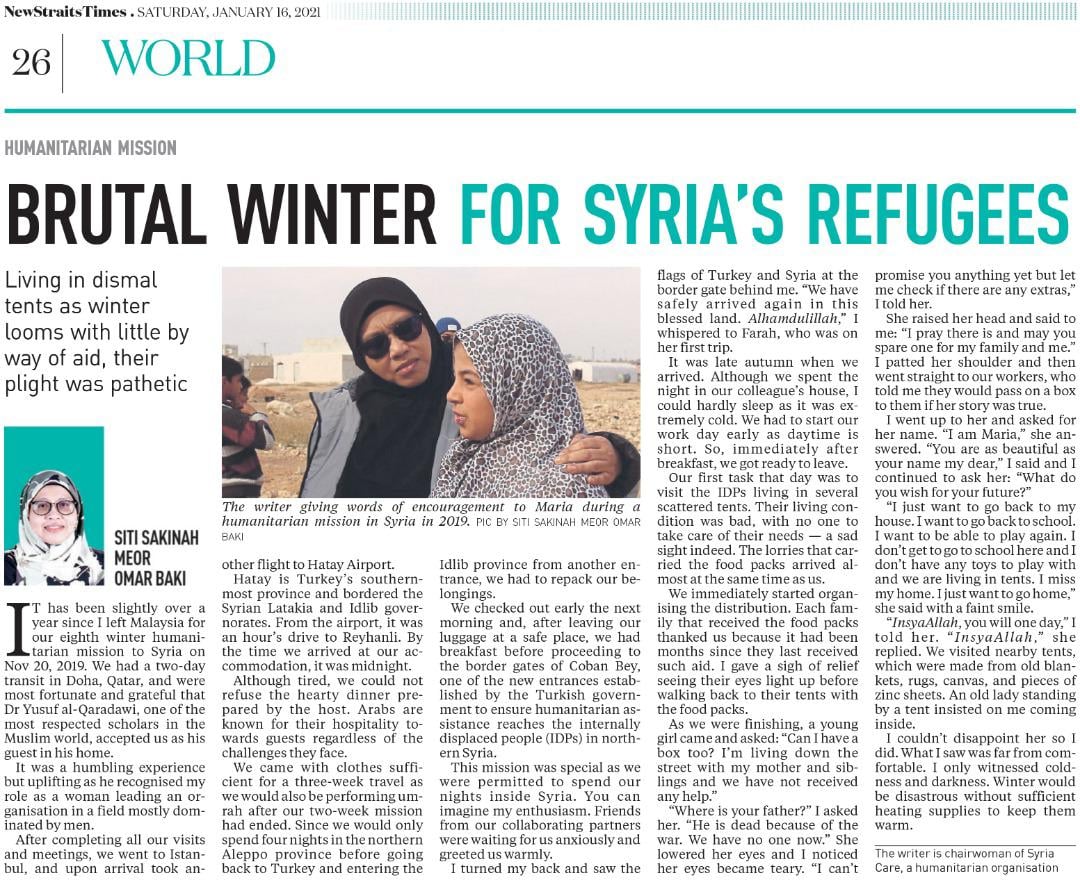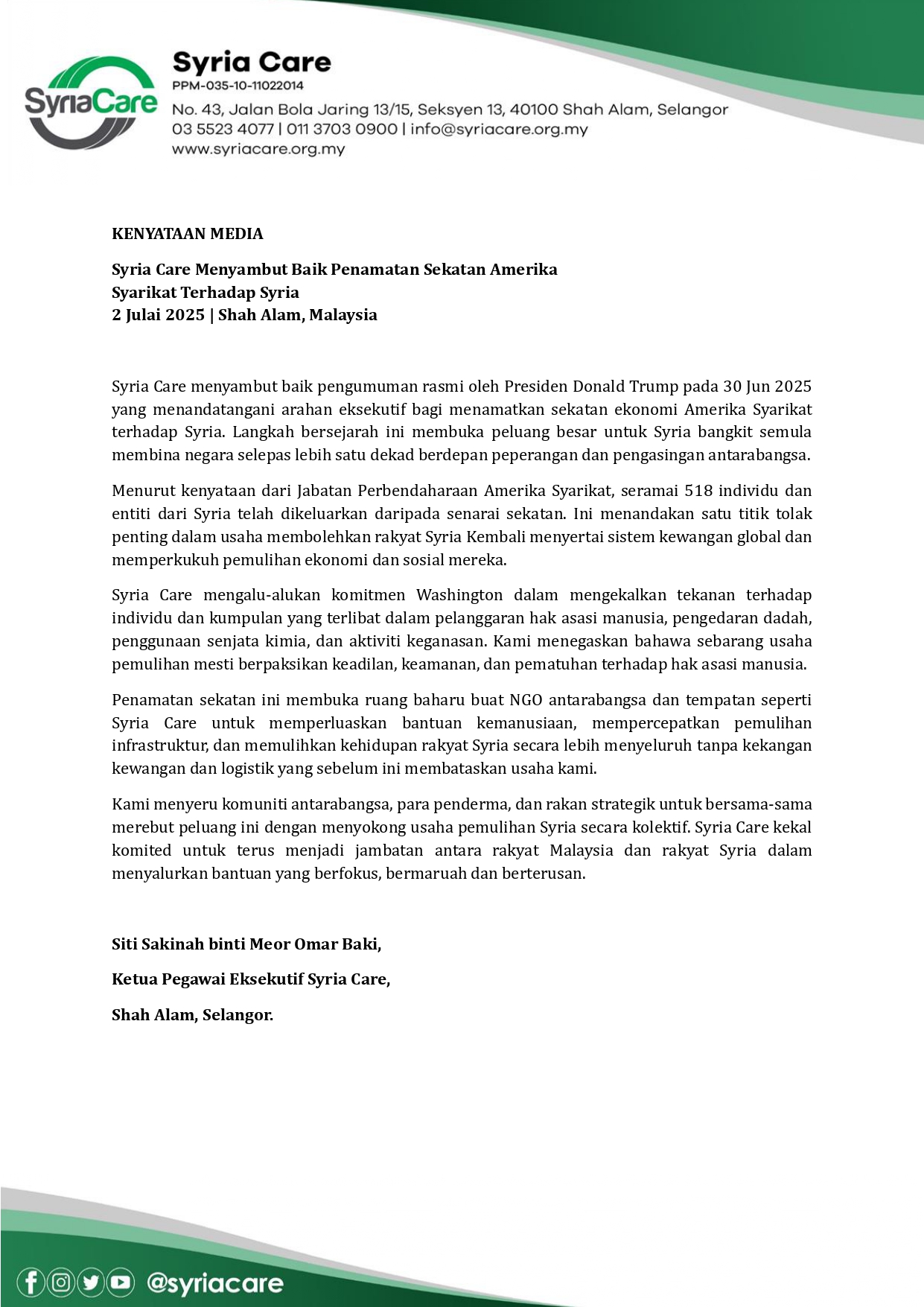It has been slightly over a year since I left Malaysia for our 8th winter humanitarian mission to Syria on the 20th of November 2019. We had a two-day transit in Doha, Qatar, and was most fortunate and grateful that Dr. Yusuf al-Qaradawi who is one of the most prominent and respected religious scholars in the Muslim world had accepted us as his guest in his home. It was a very humbling experience for us but very uplifting as he recognized my role as a woman leading an organization in a field that is mostly dominated by men.
After completing all scheduled visits and meetings we continued our journey to Istanbul, Tukey and on arrival took another flight to Hatay Airport. Hatay is Turkey’s southernmost province and situated borders to the Syrian Latakia and Idlib governorates.
From the airport, it was an hour’s drive to Reyhanli but by the time we arrived at our accommodation, it was already midnight. Although very tired and longed to lay down, we could not refuse the hearty dinner prepared by the host. Arabs are worldly known for their hospitality towards guests regardless of the challenges they face.
Finally, after dinner, we were given our rooms to rest. But not for long. We came with clothes sufficient for a three weeks travel as we would also be performing umrah after our two weeks mission ended. Since we would only spend 4 nights in the northern Aleppo province before going back to Turkey and entering the Idlib province from another entrance, we had to repack our belongings.
We checked out very early the next morning and after leaving all our luggage at a safe place, we had Turkish breakfast at a nearby restaurant before proceeding on a took two and a half hours journey to the border gates of Coban Bey.
Cobanbey is one of the new entrances established by the Turkish government to ensure humanitarian assistance reaches the less fortunate internally displaced people ( IDPs) in the northern part of Syria. Turkey under Erdogan’s government plays a large role in assisting the victims of war in Syria and is currently hosting the largest amount of Syrian refugees estimated to be approximately 3.6 thousand million people.
There was a checkpoint on the Turkey side where our passports and border crossing documents were checked. All our bags were screened thoroughly by the Turkish officials for safety purposes and we waited patiently while they did their job. Among many before it, this mission was special for the fact that we were permitted to spend our nights inside Syria. You can imagine my enthusiasm. After years of working as a humanitarian worker, this was a first as we usually enter daily from Turkey.
Friends from our collaborating partners were already waiting for us anxiously and greeted us warmly. As I turned my back and I saw the Turkey and Syrian flags at the border gate behind me I took a deep breath of relief. “We have safely arrived again in this blessed land. Alhamdulillah,” I whispered to Farah, the only female team member that accompanied me on this mission and it was her first trip. Our eyes filled with tears of happiness and gratefulness.
It was late autumn when we arrived but the weather for an Asian like me was already too cold. That night I slept wrapped inside a thick blanket wearing my jacket and socks like a cocoon. Although we slept in our colleague’s house, I felt the coldness from the brick walls, and without a heater, I could hardly sleep.
We had to start our workday early as daytime is short during this time of the year. So immediately after breakfast of bread, cheese, and eggs we got ready to leave. Breakfast is crucial because we never know when our next meal would be.
Our first task that day was to visit the IDPs that lived in several scattered tents. Their living condition was bad and unorganized with no one to actually take care of their needs. It was a sad sight indeed. The lorries that carried the food packs arrived almost at the same time as us. And we immediately started organizing the distribution. Each family that received the packs continuously thanked us because it had been months since they last received any aid.
I gave a sigh of relief seeing their eyes lit as they walked to their tents with the food packs. I kept praying in my heart “Hopefully the donations will keep on coming so we can continuously help you again”. Indeed, so many people are in need that we can’t seem to slow down in our work.
As we were finishing the distribution, a young girl came up to us and said “Can I have a box too? I’m living down the street with my mother and siblings and we have not received any help”.
“Where is your father?” I asked her.
“He is dead because of the war. We have no one now” She lowered her eyes and I noticed her eyes became teary.
“I can’t promise you anything yet but let me check first if there are any extras,” I told her. She raised her head and said to me “I pray there is and may you spare one for my family and me” I patted her shoulder and then went straight to our workers. Alhamdulillah, they told me they would check on the girl’s mother and they would definitely pass on a box to them if her story was true.
I went up to her and asked for her name. “I am Maria,” she answered.
“You are as beautiful as your name my dear,” I said and I continued to ask her “What do you wish for your future?”
“I just want to go back to my house. I want to go back to school. I want to be able to play again. I don’t get to go to school here and I don’t have any toys to play with and we are living in tents. I miss my home. I just want to go home” she said with a faint smile.
“Insya Allah you will one day,” I told her while patting her head as I remembered a hadith I once studied.
Abu Hurayrah (RA) narrated:
A man came to the Messenger of Allāh (ﷺ) and he complained about the hardness of his heart. The Messenger of Allāh (ﷺ) said: ‘If you want to soften your heart, then feed the poor and pat the head of the orphan’ source Musnad Aḥmad
“Insya Allah” she replied.
As if her words were not enough to break my heart, we visited nearby tents which were made from old blankets, rugs, canvas, and also pieces of zincs. An old lady standing by a tent insisted on me coming inside. I couldn’t afford to disappoint her so I did. What I saw was far from comfortable. I only witnessed coldness and darkness. Winter would be disastrous to them without sufficient heating supplies to keep them warm.
Siti Sakinah Meor Omar Baki
CEO of Syria Care




![Kenyataan Media Syria Menuju Masa Depan Lebih Stabil Dengan Gabungan Sdf & Kerajaan Baru[1] Page 0001](https://syriacare.org.my/wp-content/uploads/2025/03/KENYATAAN-MEDIA-SYRIA-MENUJU-MASA-DEPAN-LEBIH-STABIL-DENGAN-GABUNGAN-SDF-KERAJAAN-BARU1_page-0001-scaled.jpg)